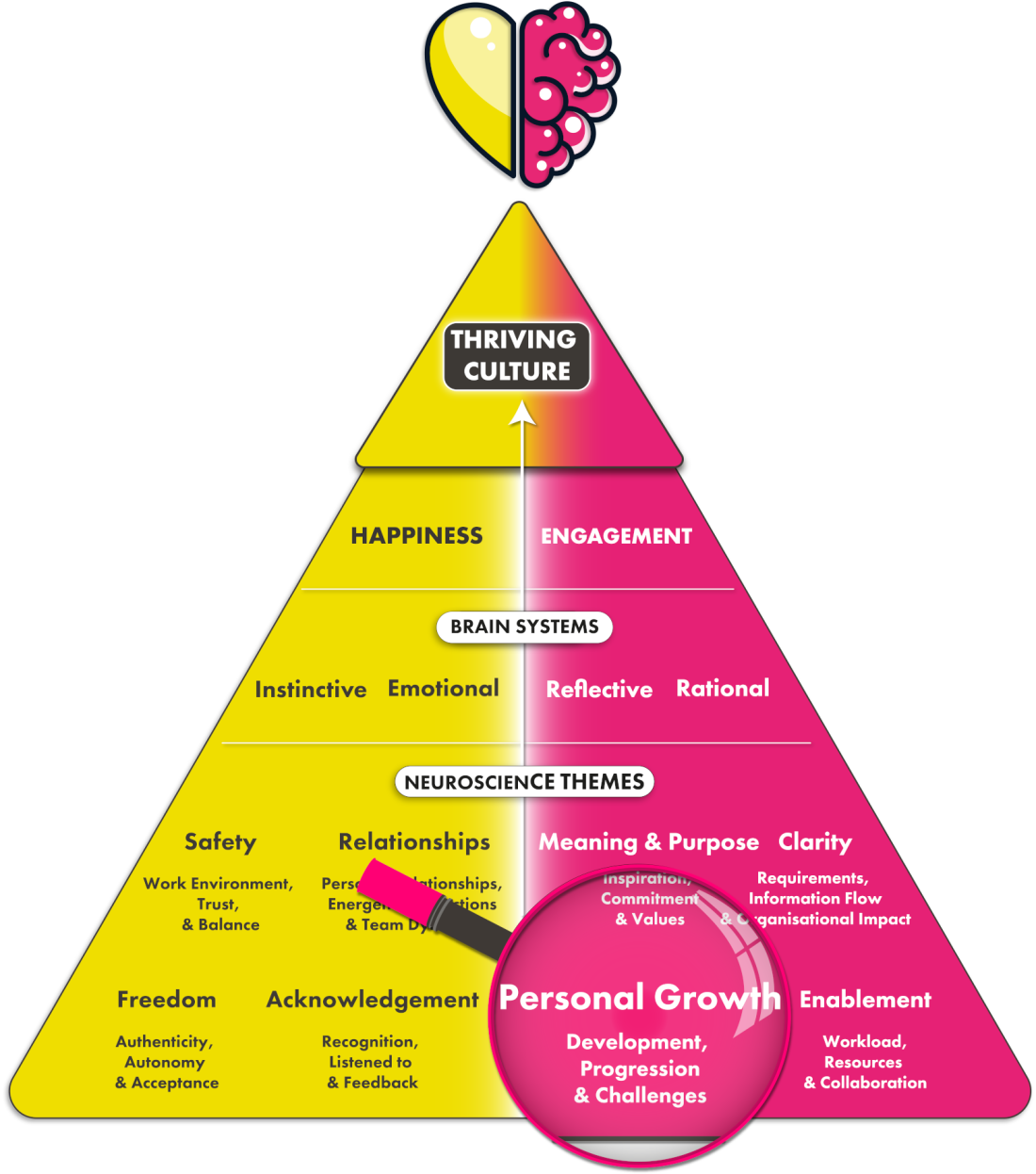Menu


Engagement in the workplace can be linked to career progression within an organisation. Career progression is associated with the Reflective brain system in our neuroscience model.
If you’ve just landed here, we recommend heading over to our brain systems and neuroscience themes pages for a clearer understanding of our neuroscience model and why we’re drilling down into this area. Otherwise, read on to find out how employee engagement can be driven by career progression.

We tend to fall into the ‘progression trap’ where we have one target and an expectation that others will support us in achieving it. But progression is really about knowing your internal driver and leveraging that throughout your organisation, while levelling up your connections and networks. This way, you can be curious about how you want to grow and what you want to strive for. It’s important to be flexible. Career ladders are not straight up and down – they move in different directions.

People change throughout life, so we can’t look at a person as a payroll number. We need to see everyone through a human factor lens. Understanding what’s happening behind the scenes is important and equally challenging. There’s a stigma that we must crawl up a laborious chain of hierarchy to get where we want in our careers. Whereas it’s actually a shared experience of being genuinely interested and caring about the people we work with as whole humans.
From an HR perspective, it can be static – using the same tools and techniques to approach performance management. The choice of staying with the same practices is usually out of a fear of challenging the status quo or supporting people on their growth journey.
Often, as leaders, we forget that our employees came to us with prior experience and overcame challenges before they joined our team. But when you give people an opportunity to achieve, it enables others to achieve, which ultimately benefits the business.
Use the people in your organisation to the best of their ability. Align people on tasks and projects that give them a passion to succeed. When you utilise people’s skills and experience, they will feel energised because they’re making a difference.
Define what the organisation means by ‘challenge’ because it’s twofold. Chaos is often the result of a lack of ownership and accountability. However, if you just bring in skilled professionals and expect them to deal with the mediocre operational stuff that has been neglected for years, it won’t take long for them to become disengaged.
Break down the challenge. With a stretch target, do the research and get individual inputs. It then becomes a collective effort to tackle those challenges, which will lead to a radical transformational change. When it comes to people transformation, it’s not a quick win. It’s an onward journey around changing the perceptions and mindset while having something tangible people can work towards.
People will disengage quite quickly. There’s research that states people decide whether they’re all in within the first 90 days. So be honest and upfront so that you can understand their personal challenges during onboarding.
We find ourselves in a very interesting space of talent at the moment with talks of recession, high interest rates and fuel poverty. A lot of people are highly likely to stay with their current employer in the short to medium term. So start thinking about how you can continue to engage these people. When we come out of this, they won’t leave because they felt cared for and supported in these challenging times.
The only way you’re going to get genuine feedback from people is if you’ve built that human-to-human relationship. Remember, feedback is like porridge – it’s best taken when it’s hot. Cold feedback isn’t received well. Recognise people are complex. Individuals need to take accountability for their journey or the baggage they’ve brought. Remember, sometimes people can be triggered by scenarios that occurred in the past because some things that cut hard and deep don’t just wash off. Deliver feedback in a way that provides psychological safety, acting as a mirror for reflection rather than as the mechanic to fix it.
Remember what you’ve done in a previous organisation and put that front and centre. Where others see roadblocks, you are able to pass the obstacle and find a solution. You’ve accomplished quite a bit that can be brought forward and demonstrated. You’re driving your career – if you don’t want to slip into second gear, you’re holding yourself back. Be selfish about the time you take for your own progression. No one will grab you by the hand and drag you through your career journey.
*This is an excerpt from the Happiness and Humans Podcast with Ben RainforthGott, Director of People & Organisational Development at Clarion Housing Group.
Related articles
Get in touch for a quick chat with one of our experts to see how we can help you.
Take our benchmark to map where your organisation is now, and where it needs to be.